Heteroptera
True bugs
Dimitri Forero


This tree diagram shows the relationships between several groups of organisms.
The root of the current tree connects the organisms featured in this tree to their containing group and the rest of the Tree of Life. The basal branching point in the tree represents the ancestor of the other groups in the tree. This ancestor diversified over time into several descendent subgroups, which are represented as internal nodes and terminal taxa to the right.

You can click on the root to travel down the Tree of Life all the way to the root of all Life, and you can click on the names of descendent subgroups to travel up the Tree of Life all the way to individual species.
For more information on ToL tree formatting, please see Interpreting the Tree or Classification. To learn more about phylogenetic trees, please visit our Phylogenetic Biology pages.
close boxDiscussion of Phylogenetic Relationships
Alternative views on the relationships of Heteroptera have been proposed. For instance:Tree from Schuh (1979); and Schuh and Polhemus (1980).
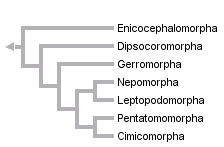
Tree modified from Zrzavy (1992):
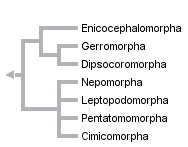
Tree modified from Manher (1993); Shcherbakov and Popov (2002):
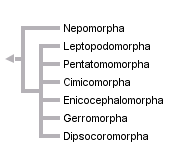
References
Andersen, N. M. 1982. The Semiaquatic Bugs (Hemiptera, Gerromorpha) Phylogeny, Adaptations, Biogeography and Classification. Entomonograph vol. 3, Klampanborg, Denmark.
Bourgoin, T. 1986. Morphological value of the maxillary plate in the Hemiptera: Phylogenetic remarks. Annales De La Societe Entomologique De France 22(4): 413-422.
Carver, M., G.F. Gross and T.E. Woodward. 1991. Hemiptera (bugs, leafhoppers, cicadas, aphids, scale insects etc.). Pages 429-509 in The Insects of Australia. I.D. Naumann, ed. Melbourne University Press, Melbourne, Australia.
Cobben, R. H. 1968,1978. Evolutionary trends in Heteroptera. Parts 1,2. Wageningen, Netherlands.
Dolling, W. R. 1991. The Hemiptera. Oxford University Press, London: 274 pp.
Drake, C. J. and Ruhoff, F. A. 1965. Lace bugs of the world: a catalogue (Hemiptera: Tingidae. Smithsonian Institution, Washington: 634 pp.
Henry, T.J. & R.C.Froeschner, eds. 1988. Catalog of the Heteroptera, or True Bugs, of Canada and the Continental United States. E. J. Brill, Leiden.
Horvath, Geza. 1927. General catalogue of the Hemiptera. Smith College Pub, Northhampton, Mass: Vol 23.
Manher, M. 1993. Systema Cryptoceratorum Phylogeneticum
(Insecta, Heteroptera). Zoologica 48 (143): 1-302.
Miller, N. C. E., 1956, Biology of the Heteroptera. Methuen, London
Parshley, H. M. 1925. A bibliography of North American Hemiptera-Heteroptera. Smith College Pub., Northhampton, Mass.: 252 pp.
Schaefer, C.W. 1990. The Hemiptera of North America: what we do and do not know. Pages 105-118 in Systematics of the North American insects and arachnids: status and needs. Contribution No. 3 to the National Biological Survey. Info. Ser. 90-1. Kosztarab, M., Schafer, C.W. . eds. Virginia Agricultural Experiment Station, Blacksburg.
Schaefer, C. W. (ed.) 1996. Studies on Hemipteran Phylogeny. Proceedings of Thomas Say Publications in Entomology, Entomological Society of America, Lanham, Maryland.
Schuh, R. T. 1979. Review of Cobben, Evolutionary trends in Heteroptera. Syst.Zool. 28:653-656.
Schuh, R. T. 1986, The influence of cladistics on heteropteran classification. Annual Review of Entomology 31: 67-94.
Schuh, R. T. and P. Stys. 1991. Phylogenetic analysis of cimicomorphan family relationships (Heteroptera). Journal Of The New York Entomological Society 99(3): 298-350.
Schuh, R.T. and J.A. Slater. 1995. True Bugs of the World (Hemiptera: Heteroptera). Classification and Natural History. Cornell University Press, Ithaca, New York. xii + 336 pp.
Schuh, R.T., C. Weirauch, and W.C. Wheeler. 2009. Phylogenetic relationships within the Cimicomorpha (Hemiptera: Heteroptera): a total-evidence analysis. Systematic Entomology 34: 15-48.
Shcherbakov, D.E. and Y.A. Popov. 2002. Superorder Cimicidea Laicharting, 1781. Order Hemiptera Linné, 1758. The bugs, cicadas, plantlice, scale insects, etc. (= Cimicida Laicharting, 1781, = Homoptera Leach, 1815 + Heteroptera Latreille, 1810). pp. 143-157. In: Rasnitsyn, A. P.; Quicke, D. L. J. (eds.). History of Insects. Kluwer Academic Publishers, the Netherlands. 517 p.
Slater, J. A. & R. M. Baranowski, 1978. How to Know the True Bugs (Hemiptera - Heteroptera). Brown, Dubuque.
Stys, P. 1996. Some groundplan characters of the Heteroptera. Pages 111-118 in Studies on Hemipteran Phylogeny. C. W. Schaefer, ed. Proceedings of Thomas Say Publications in Entomology, Entomological Society of America, Lanham, Maryland.
Stys, P. and Kerzhner, 1975. The rank and nomenclature of higher taxa in recent Heteroptera. Acta Entomologica Bohemoslovaca 72: 64-79.
Torre-Bueno, J. R. 1939. A synopsis of the Hemiptera-Heteroptera of America north of Mexico. Brooklin Entomological Society, Brooklin, New York: 122 pp.
Vasarhelyi, T. 1987. On the relationships of the eight aradid subfamilies (Heteroptera). Acta Zoologica Hungarica 33(1-2): 263-268.
Vasquez, M. and T. Lopez. 1999. Filogenia de Heteroptera (Phylogeny of Heteroptera). Boletin de la SEA 26:427-434.
Wheeler, W.C., R.T. Schuh, and R. Bang. 1993. Cladistic relationships among higher groups of Heteroptera: congruence between morphological and molecular data sets. Entomologica Scandinavica 24:121-137.
Wootton, R. J. and C. R. Betts. 1986. Homology and function in the wings of Heteroptera. Systematic Entomology 11(3): 389-400.
Wygodzinsky, P. W. and K. Schmidt. 1991. Revision of the New World Enicocephalomorpha (Heteroptera). Bulletin of The American Museum of Natural History 200: 1-265.
Zrzavy, J. 1992. Evolution of antennae and historical ecology of the hemipteran insects (Paraneoptera). Acta Entomologica Bohemoslovaca 89(2): 77-86.
Zrzavy, J. 1992. Morphogenesis of antennal exoskeleton in Heteroptera (Insecta): From phylogenetic to ontogenic pattern. Acta Entomologica Bohemoslovaca 89(3): 205-216.
Title Illustrations

| Scientific Name | Sigara nigrolineata |
|---|---|
| Location | Slovenia |
| Specimen Condition | Live Specimen |
| Life Cycle Stage | Adult |
| Copyright |
© Andrej Gogala

|
| Scientific Name | Lygus sp. |
|---|---|
| Location | Northern Sierra Nevada, California, USA |
| Comments | Tarnished plant bug |
| Specimen Condition | Live Specimen |
| Copyright |
© 2004 Alex Wild

|
| Scientific Name | Ischnodemus sabuleti |
|---|---|
| Location | Germany |
| Specimen Condition | Live Specimen |
| Life Cycle Stage | adult |
| Copyright |
© 2003 Jürgen Deckert

|
About This Page
Dimitri Forero

University of California Riverside, Riverside, California, USA
Correspondence regarding this page should be directed to Dimitri Forero at
dimitri.forero@ucr.edu
Page copyright © 2009 Dimitri Forero
 Page: Tree of Life
Heteroptera. True bugs.
Authored by
Dimitri Forero.
The TEXT of this page is licensed under the
Creative Commons Attribution-NonCommercial License - Version 3.0. Note that images and other media
featured on this page are each governed by their own license, and they may or may not be available
for reuse. Click on an image or a media link to access the media data window, which provides the
relevant licensing information. For the general terms and conditions of ToL material reuse and
redistribution, please see the Tree of Life Copyright
Policies.
Page: Tree of Life
Heteroptera. True bugs.
Authored by
Dimitri Forero.
The TEXT of this page is licensed under the
Creative Commons Attribution-NonCommercial License - Version 3.0. Note that images and other media
featured on this page are each governed by their own license, and they may or may not be available
for reuse. Click on an image or a media link to access the media data window, which provides the
relevant licensing information. For the general terms and conditions of ToL material reuse and
redistribution, please see the Tree of Life Copyright
Policies.
- Content changed 27 February 2009
Citing this page:
Forero, Dimitri. 2009. Heteroptera. True bugs. Version 27 February 2009 (under construction). http://tolweb.org/Heteroptera/10805/2009.02.27 in The Tree of Life Web Project, http://tolweb.org/




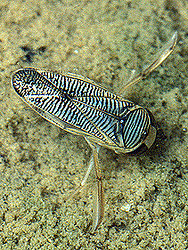
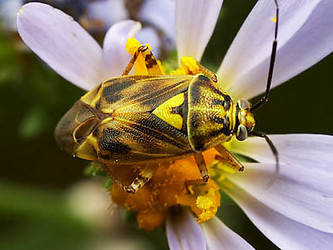
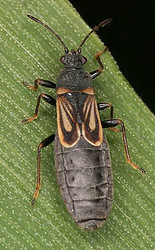




 Go to quick links
Go to quick search
Go to navigation for this section of the ToL site
Go to detailed links for the ToL site
Go to quick links
Go to quick search
Go to navigation for this section of the ToL site
Go to detailed links for the ToL site